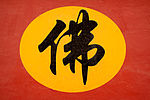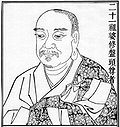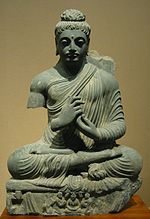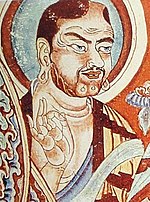Yogachara (redirect from Yogācāra Buddhism)
Yogachara (Sanskrit: योगाचार, IAST: Yogācāra) is an influential tradition of Buddhist philosophy and psychology emphasizing the study of cognition, perception...
150 KB (18,341 words) - 04:31, 11 November 2024
East Asian Yogācāra refers to the traditions in East Asia which developed out of the Indian Buddhist Yogācāra (lit. "yogic practice") systems (also known...
48 KB (5,828 words) - 23:40, 16 September 2024
Zhang Binglin (section Yogacara and Zhang)
Practicers/proponents of Yogacara stress attention to the issues of cognition, consciousness, perception, and epistemology. Yogacara Buddhism is based on...
25 KB (3,226 words) - 10:49, 12 September 2024
Buddhist philosophy (section Yogācāra)
Dan (2018). What is and isn't Yogacara. Lusthaus, Dan, What is and isn't Yogacara, http://www.acmuller.net/yogacara/articles/intro.html Lusthaus, Dan...
147 KB (18,720 words) - 09:42, 2 November 2024
Śāntarakṣita (redirect from Yogacara-Madhyamaka synthesis)
Yogācāra and the logico-epistemology of Dharmakirti into a novel Madhyamaka philosophical system. This philosophical approach is known as Yogācāra-Mādhyamika...
28 KB (3,345 words) - 13:01, 19 September 2024
Idealism is also found in some streams of Mahayana Buddhism, such as in the Yogācāra school, which argued for a "mind-only" (cittamatra) philosophy on an analysis...
112 KB (14,510 words) - 18:46, 6 November 2024
Eight Consciousnesses (category Yogacara)
aṣṭa vijñānakāyāḥ) is a classification developed in the tradition of the Yogācāra school of Mahayana Buddhism. They enumerate the five sense consciousnesses...
52 KB (5,503 words) - 04:05, 17 September 2024
system first appears in the Saṃdhinirmocana Sūtra and in the works of the Yogācāra school. This classification system later became prevalent in various modified...
25 KB (2,886 words) - 03:34, 14 May 2024
Vasubandhu (category Yogacara scholars)
half-[citation needed]brother, Asanga, he was also one of the main founders of the Yogacara school. Vasubandhu's Abhidharmakośakārikā ("Commentary on the Treasury...
30 KB (3,504 words) - 09:44, 8 October 2024
Asanga (category Yogacara scholars)
(fl. c. 602 – 664), a Chinese monk who traveled to India to study in the Yogacara tradition tells a similar account of these events: In the great mango grove...
19 KB (2,237 words) - 02:19, 7 November 2024
Nondualism (section Yogācāra tradition)
postulating an underlying "basis of unity", both in the Buddhist Madhyamaka and Yogacara schools, and in Advaita Vedanta, collapsing phenomenal reality into a "single...
177 KB (21,495 words) - 17:09, 7 November 2024
Buddha-nature (section Yogācāra school)
Mādhyamaka concept); with the storehouse-consciousness (ālāyavijñāna, a Yogācāra concept); and with the interpenetration of all dharmas (in East Asian traditions...
110 KB (13,489 words) - 08:01, 10 November 2024
Sthiramati was a student of a Yogācāra scholar named Gunamati, and he was also a contemporary of another 6th century Yogācāra scholar, Dharmapala of Nālandā...
10 KB (1,252 words) - 13:38, 24 October 2024
Madhyamaka (section Yogācāra-madhyamaka)
to exist in the first place. Candrakīrti also criticized the Buddhist yogācāra school, which he saw as positing a form of subjective idealism due to their...
142 KB (17,763 words) - 16:20, 26 September 2024
Maitreya-nātha (category Yogacara scholars)
Giuseppe Tucci, and Hakuju Ui to distinguish one of the three founders of the Yogācāra school of Buddhist philosophy, along with Asanga and Vasubandhu. Some scholars...
8 KB (885 words) - 01:45, 8 October 2024
of Temple University's Department of Religion, and is a specialist in Yogācāra. The author of several articles and books on the topic, Lusthaus has taught...
4 KB (459 words) - 06:21, 3 October 2023
Śūnyatā (section Yogācāra school)
assertions and need not construct formal arguments. The central text of the Yogācāra school, the Saṃdhinirmocana-sūtra, explains emptiness in terms of the three...
83 KB (9,758 words) - 06:14, 1 November 2024
of various Mahāyāna Yogacara texts on the philosophical theory known as vijñapti-matra (conscious construction only). The Yogacara school philosopher Asanga...
150 KB (17,731 words) - 13:45, 12 November 2024
Mahayana Buddhists traditionally consider Maitreya to be the founder of the Yogacara tradition through his revelation of various scriptures like the Mahāyānasūtrālamkārakā...
75 KB (8,280 words) - 04:37, 9 November 2024
Rangtong and shentong (redirect from Yogacara-Madyamaka)
Indian and Tibetan doctrinal discussions on the topics of Madhyamaka, Yogacara, and the theory of Buddha-nature. Shentong adherents generally trace the...
49 KB (6,100 words) - 03:29, 17 September 2024
thinkers deny that the Indian Yogacāra masters held the view of the ultimate existence of the mind, and thus, they place Yogācāra on a level comparable to...
133 KB (15,402 words) - 01:05, 11 November 2024
Middle Way (section Yogācāra)
The Yogācāra school examines emptiness through its central teaching of the three basic modes of existence or "three natures" (svabhāva). In Yogācāra, the...
39 KB (5,302 words) - 19:43, 24 October 2024
Cheng Weishi Lun (category Yogacara)
Catalog number 1585), is a comprehensive treatise on the philosophy of Yogacara Buddhism and a commentary on Vasubandhu's seminal work, the Triṃśikā-vijñaptimātratā...
9 KB (1,146 words) - 01:06, 30 September 2024
Sarvāstivadā Pudgalavada Sautrāntika Madhyamaka Svatantrika and Prasangika Śūnyatā Yogacara Tibetan Persian Mazdakism Mithraism Zoroastrianism Zurvanism...
196 KB (17,370 words) - 13:02, 2 November 2024
Chandrakirti (section Critiques of Yogācāra)
Chandrakirti arguing for the Madhyamaka position and Chandragomin taking on the Yogacara view. This debate was said to have attracted a large crowd. Over the course...
39 KB (4,879 words) - 21:45, 17 September 2024
Vitarka-vicāra (section Yogacara)
attains one-ness of mind and thus moves from first to second jhāna". The Yogacara term manas means both "intentionality" or 'self-centered thinking', and...
15 KB (1,491 words) - 12:25, 1 November 2024
Zen (category Yogacara)
Buddhist teachings on the bodhisattva path, Chinese Madhyamaka (Sānlùn), Yogacara (Wéishí), the Prajñaparamita literature, and Buddha nature texts like the...
197 KB (22,967 words) - 18:10, 11 November 2024
Sarvāstivadā Pudgalavada Sautrāntika Madhyamaka Svatantrika and Prasangika Śūnyatā Yogacara Tibetan Persian Mazdakism Mithraism Zoroastrianism Zurvanism...
94 KB (11,678 words) - 03:40, 16 October 2024
Triṃśikā-vijñaptimātratā (category Yogacara)
became one of the core texts for the Yogācāra school of Mahāyāna Buddhism. In it he touches on foundational Yogācāra concepts such as the storehouse consciousness...
4 KB (511 words) - 21:18, 2 April 2024

















